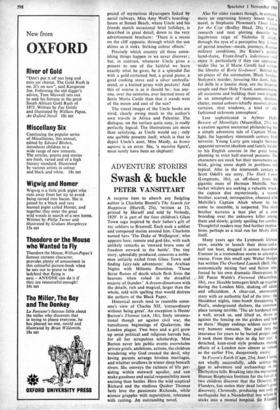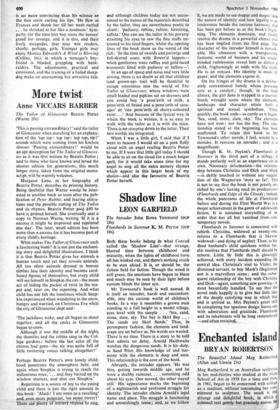ADVENTURE STORIES
Swash & buckle
PETER VANSITTART
A surprise item to absorb any fledgling author is Charlotte Bronte's The Search for Happiness (Harvill, 25s), 'written at 13, printed by Herself and sold by Nobody, 1829'. It is part of the four children's Glass Town saga inspired by their father's gift of toy soldiers to Branwell. Each took a soldier and composed stories around him. Charlotte named hers 'The Duke of Wellington', who appears here, remote and god-like, with such unlikely remarks as 'onward brave sons of freedom onward to the battle'. The tiny story, splendidly produced, concerns a noble- man unfairly exiled from Glass Town and finding fairy-tale adventures: the Arabian Nights with Miltonic flourishes. 'Those fierce flames of death which flash from the heavens when robed in the dreadful majesty of thunder.' A dream-dimension with the details, rich and magical, larger than the whole, told with spelling that would distress the authors of the Black Paper.
Historical novels tend to resemble some- one's view of Charles XII, 'extraordinary without being great'. An exception is Hester Burton's Thomas (our', 18s), finely unsensa- tional though set against civil war, the ttunultuous beginnings of Quakerism, the London plague. Two boys and a girl grow up amid political and religious hatreds but, for all her scrupulous scholarship, Miss Burton never lets public events overwhelm private griefs, ambitions, actions, the children wondering why God created the devil, why loving parents arrange loveless marriages, and whether swallows in winter sleep beneath rivers. She conveys the richness of life per- sisting within outward squalor, and can make goodness and social responsibility more exciting than battles. Here the wild sceptical Richard and the studious Quaker Thomas both love the passionate Richenda, while science grapples with superstition, tolerance with ranting. An outstanding novel. Also for older readers though, in contrast, more an engrossing history lesson than a novel, is Stephanie Plowman's Three Lives for the Czar (Bodley Head, 28s). Careful research and neat plotting describe the lugubrious reign of Nicholas II chiefly through the eyes of a perceptive boy. Lovers of period touches—meals, journeys, Russian military conditions, the Kaiser's painful hand-shake, Franz-Josef's lederhosen—will -. enjoy it, particularly if they can appreciate asides like 'as if Marie Corelli had written the libretto of Boris Godunov'. Behind the set-pieces of the coronation, Black Sunday, Stolypin's murder, hovering like dank, bale- ful dolls in a lunatic shop, are the Imperial couple and their Holy Friend, contaminating all occasions and building their own tragedy in an atmosphere of 'dampness, dimness, clutter, muted colours (chiefly mauve), drawn curtains, shut windows, a kind of old- fashioned sickroom atmosphere'.
Less sophisticated is Aylmer Hall's Beware of Moonlight (Macmillan, 25s), not a caution against nocturnal philandering but a simple adventure tale of Captain Moon- light, the legendary nineteenth century Irish terrorist. Young Larry gets caught between apparent terrorist idealism and family loyalty to his English cousins in the great house planning to evict half-starved peasants. The characters are stock but their movements are brisk, giving some depth to problems still topical. Also in the nineteenth century is Scott Odell's sea story, The Dark Canoe (Longmans, 16s), an off-shoot from the gigantic mass of Herman Melville. Nan. tucket whalers are seeking a valuable wreck, the captain dies mysteriously, a second brother, scarred, introspective, obsessed with Melville's Captain Ahab whom he has come to resemble, is suspected. The third brother narrates a taut plot of a crew brooding over the unknown killer among them and slowly, grimly spoiling for conflict. Thoughtful readers may find further implica- tions, perhaps as a trial run for Moby Dick itself.
Many years ago the Lynmouth lifeboat crew, unable to launch their three-and-a- half ton boat, dragged it across hazardous Exmoor in a tremendous storm to attempt a rescue. From this small epic Walter Hodges has written The Overland Launch (Bell, 30s), economically mixing fact and fiction rein- forced by his own dramatic illustrations. la Jill Paton Walsh's Fireweed (Macmillan, 18s), two likeable teenagers hitch up together during the London blitz, shaking off adults and officialdom. A clear-cut, unromantic story with an authentic feel of the time: the bloodshot nights, time-bomb threatening St Paul's, underground shelters, the common. place turning terrible. 'The air hardened into a wall, struck Us, and lifted us, threw us against the fencing on the girders and held us there.' Happy endings seldom occur but wry humour remains. She paid into the insurance for years to be buried proper. and it took them three days to dig her out. A detached, keen-eyed style produces moving effects of a London now almost as remote as the earlier Fire, dangerously exotic.
In Foxon's Earth (Cape, 25s), Joan Clarke, not wholly successfully, adds science fic. Ion to adventure and archaeology in the Derbyshire hills. Breaking into the mysterious Human Biophysics Institute for the fun of two children discover that the Director, Si Flanders, has stolen their dead father's great discovery, Chronody, producing not only an earthquake but a Neanderthal boy whom he sticks into a mental hospital. Sir Flanders is no more convincing than his science or the thin smile curling his lips. 'He flew at Frances and shook her till her teeth rattled ... he shrieked at her like a madman.' Sym- pathy for the time-lost boy ousts the heroes' greed for revenge, and it is this, and their lively escapades, that may win readers, chiefly, perhaps, girls. Younger girls may enjoy Monica Edwards's A Wind is Blowing (Collins, 16s), in which a teenager's boy- friend is blinded, grappling with bank- raiders. The adjustments, practical and emotional, and the training of a failed sheep- dog make an unassuming but attractive tale.















































 Previous page
Previous page